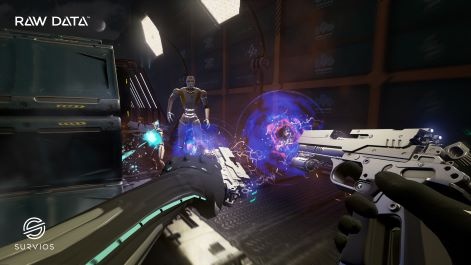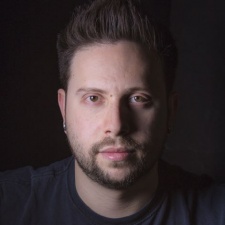The visuals are, of course, essential to creating an immersive VR experience. But don't overlook the role of sound, and particularly music, to create atmosphere and emotion.
Raw Data is a robot shooter coming soon to HTC Vive and Oculus Touch, and available now as an Early Access game on Steam. It will feature a score by composer Jeremy Nathan Tisser. Like The Virtual Report, Tisser was in San Francisco last week for VRDC. Sitting down with him in the bustling lobby of the Marriott Marquis near the convention centre, we quizzed him about how he got into the business and the challenges of composing for a VR game.
TVR.biz: Where did it all begin for you?
JEREMY NATHAN TISSER: I'll probably give you the same answer any composer will give you. I've been playing since I was four. I started piano, moved my way to drums, played in bands all through high school. I went on tour with a friend's band. I worked at a record label. I went to college. I did the whole spiel, and ended up going to graduate school at the University Of Southern California, where I did their film scoring programme. It was there I met some friends who were doing virtual reality projects - about five-and-a-half years ago.
That was pretty ambitious at the time? It's taken VR a while to get from there to here.
Yeah, it was pre-Oculus. And at the time, Palmer Luckey was actually still working at USC's mixed reality lab, building the head mounts for VR. And there was all the first augmented reality stuff going on there.
I signed on to do this master's thesis project called Shayd, which was this really lovely project. The idea was: you could walk around in an alien world and explore and meet friendly little aliens – but physically walk around this space. So, pre-HTC Vive, pre-Oculus, Palmer built the head mount for it. So that's where I met him!
And then I met my good friend James Iliff, who's now the Chief Creative Officer of Survios, because he was designing levels on that first game. We became really close friends through that. He would be showing me all the cool new artwork he'd be making in the game for it. I'm a composer but I went to every production meeting for this project, because I was just so fascinated by the concept of exploring an alien world and getting to write some beautiful music to it.
At the end of the year, when the project came out, James brought me along to do Project Holodeck, with him and Nathan Burba, where we did Wild Skies and Zombies On The Holodeck. And then, three-and-a-half years later, they called me and said, "Hey, we've got this game Raw Data. Do you want to do that?"
You've also done film work as well as games. Did this happen at the same time?
That was in college. I've always wanted to be in movies. I'm an LA native, so I've always been fascinated by the Hollywood lifestyle and the Hollywood dream, even though I'm from there! But as I got older, technology started improving, and I've always loved virtual reality. Ever since the giant things at the arcade which you just pull over your head and you can only do it for five minutes before you puke! So, I found a knack for storytelling with music. And yeah, I just fell in love with writing dramatic stories and music. I'm a drummer and I have a rock background. So I like fast, action-based music.
What are the different challenges from scoring a VR game and from scoring a film?
I think film is harder actually. Because with film, you're locked. You have a time. You have to hit this sync point on the screen, and you have to tell the story, and it has to grow. That could be a six-minute piece of music that has to be sustained on the visuals. It can't get in the way, and it all has to build to that moment for release. And that's throughout the whole project. In television, you've got three days to write 40 minutes of music! It's absurd. But in videogames it can be, for the composer, a year-and-a-half or two years to write an hour of music. I can sit at the piano and work out every freaking note myself, and it's brilliant.
With VR, specifically with Raw Data, our approach was: "What are the favourite movies that he grew up on? What are the movies that made us fall in love with this? What is it that they did that made us fall in love with it? Now, let's apply that to VR."
James and I have had these conversations since college. VR is more immersive. It's like what Hollywood used to be. You'd go to the cinema and you'd have this massive screen, this great sound system, and you'd be in it. And that, to us, is what VR is today. So we wanted to apply those concepts together, and make it dramatic.
Do you have to think about the 3D space when creating music for a VR game? Spatial audio?
I think it can be, but that has to be something very specific and with purpose – in my personal opinion. It could be cool if you're writing and orchestrating music that's meant to be heard in surround sound. For example, if you have a group of Taiko drum players in a circle; if you want to be the guy standing in the middle, hearing them around you, that can be really cool. However, what I've found for Raw Data was that kind of thing gets in the way. So it's better to have music be more whatever you're used to, and that helps put you in the world, as opposed to take you out.
Tell us a little bit about Raw Data, because you've been involved since the beginning.
It's a sci-fi horror wave-based shooter. So far, we're in the early access stage. It's still on Steam, and it's been doing very well. They took the concept of a wave-based shooter and blew it up, basically. So you have different areas. You go and fight off these robots.
You're fighting off the robots to protect your job, which is to extract the raw data from this company that you're trying to hack into. You can fire a shotgun with full cocking abilities, double pistols, katanas and stuff. It's really heart-pounding. It's probably one of the more intense games I've got to play. When you're in there and you have these jumping robots flying at your face and you have nothing but a sword, it's pretty exhilarating.

You mentioned a passion for those early arcade VR games. Now Raw Data is going to be in arcades as well. How exciting is that for you as a gamer?
It's really exciting. I'm curious to see it. The idea of walking into an arcade and seeing a game I've worked on – especially a VR game – is really exciting. I'm probably going to turn into a little kid again.
I've always loved these technologies that push boundaries. I've never liked the idea of sitting back, away from something, kind of watching your friends just sit there and playing a game. But when everyone's in a room, gathered around someone in a headset, and the guy's swinging their arms, and everyone's trying to avoid getting punched in the face [laughs]. To me, that's a good time. I love that.
It's very easy to talk about the graphics when discussing VR. But sound is important for the experience. Why should more developers think like Survios, and talk to the composer right from the start?
The VR world and the games world is a Silicon Valley-based idea. It's the tech companies. Music is more artistic, and it's very easy to overlook the artistic side of things.
But I think it's important because the right music can set the tone. And we've seen a lot of movies and TV shows over the years that come out and have very safe music. Even in Hollywood, music is becoming an afterthought, and a lot of projects are suffering from it.
I think it's important to hire a composer who you know and trust – not just someone that's safe, but you know they can tell a story that a game really needs to be elevated.
For example, on Raw Data, I pitched the idea of using this instrument called a Blaster Beam, which Jerry Goldsmith used on the original Star Trek: The Motion Picture. That instrument was the sound he played for V'Ger's spaceship…
The one that goes bowww...
Yes! That thing. I found the guy that played it, and the instrument – the exact one that was used. I went and recorded it on the game, and now it's in Raw Data. So I think it's little details like that. Even if you might not identify it while you're playing. But it's the small things. Even if you don't notice it, it's still one of those things that if you didn't have it there, you might miss it. I like to push things as far as it can go.
Find out more about Raw Data at the official website. You can follow Jeremy Nathan Tisser on Twitter. VRDC took place on 27th and 28th February in San Francisco. If you're already hungry for more VR business talks and panels, sign up now for VR Connects, our own conference taking place in San Francisco in June.













